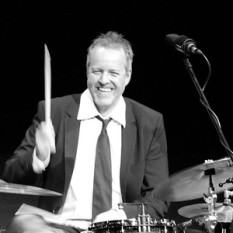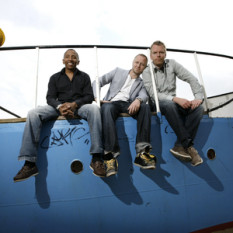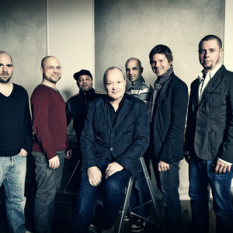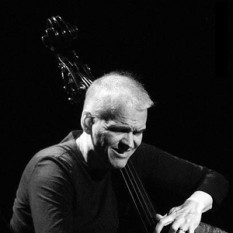Nils Wülker (* 17. August 1977 in Bonn) ist ein deutscher Jazzmusiker (Trompete, Komposition) und -komponist und Produzent.
(scroll down for english version)
Das Lustprinzip
6 - das ist die Anzahl der Alben von Nils Wülker, die Anzahl der Musiker auf seinem neuesten Werk, der Titel des neuen Albums. Pragmatisch, prägnant und unprätentiös, unverkennbar Nils Wülkers Handschrift. Einerseits. Doch musikalisch dürfte „6“ den Erwartungen des Feuilletons erst einmal diametral entgegenstehen. Denn das Album überrascht, schon der Opener "Fast Forward" ist wie eine vorweggenommene Inhaltsangabe: Es groovt, funkt und rockt, mit Lust an der Hookline und mit knarzendem Dreck unter den Ventilen. Eine vibrierende Mischung aus Kraft und Leichtigkeit - die Schlagzahl für die restlichen neun Titel ist klar vorgegeben.
Ob das noch Jazz ist? “Ich weiß es nicht. Jazz ist mein Background, und das Album atmet sicher den freiheitlichen Geist dieser Musik. Aber: Darf man das? Darf man das nicht? Was sagt die Jazz-Theorie? - Diese Fragen haben mich noch nie umgetrieben. Mich interessiert nur: Ist die Musik intensiv? Dann packt sie mich. Und diese neue Richtung hat mich auf einen Schlag unfassbar elektrisiert.”
Mit “6” verlässt Nils Wülker die musikalische Linie der Vorgängeralben, ohne seine eigene zu verlieren oder gar zu verleugnen. Die Aufnahmen sind das Ergebnis einer organischen Entwicklung: “Ich habe zuletzt live einfach großen Gefallen daran gefunden, es richtig krachen zu lassen, und der Band ging es genauso.” Viele alte Titel bekamen ein neues Gewand verpasst, und als für eine Doppel-Tournee mit Stacey Kent das Programm gekürzt werden musste, blieben plötzlich nur noch die rockigen Nummern übrig. Keine Frage: Für das neue Album musste etwas anderes her, roher und direkter als bisher.
Aus einer Laune heraus erweiterte Nils Wülker seine private Instrumentensammlung um Gitarre und Bass, spaßeshalber, und um sich auszuprobieren. “Es war amüsant, musikalisch mal wieder totaler Anfänger zu sein, das Spielkind herauszulassen und sich so neue Inspiration zu holen.” Ein kurzzeitiger Perspektivenwechsel, untermalt von Miles Davis genauso wie von John Mayer, Phoenix oder Death Cab for Cutie im CD-Player, der immer neuen sanften Mädchen-Stimmen im Jazz langsam überdrüssig. Und ganz konsequent fallen die neuen Stücke deutlich gitarrenlastiger aus als es bisher der Fall war. Auf den letzten Alben übernahm Sting-Gitarrist Dominic Miller die sporadisch anfallenden Gitarrenparts; nun gibt es mit Arne Jansen ein neues festes Mitglied in der Nils Wülker Group, und zwar sowohl auf dem Album als auch auf der Bühne, wo in Kürze bereits das zehnjährige Band-Jubiläum begangen wird. “Ich wollte einen sehr kompakten Bandsound”, sagt Wülker, “das, was auch eine gute Rockband ausmacht. Und zum Stil der neuen Titel gehörte für mich einfach deutlich mehr Gitarre”. Der Sound unterstreicht auch den Song-Charakter seiner Kompositionen, die zwar immer wieder Raum für die individuelle Klasse der Musiker lassen, jedoch ohne diese Soli zu sehr in den Fokus zu rücken. Das Augenmerk gilt anderem: Nils Wülker gilt seit geraumer Zeit als der Songwriter unter den Jazzern, und mit “6” geht er noch einen großen und entschiedenen Schritt weiter in dieser Richtung, alle Stücke folgen einem klaren Aufbau mit Strophen und Chorus. Die Melodiestimme übernimmt dabei im Normalfall Wülkers Trompete, häufig im kongenialen Wechsel- und Zusammenspiel mit Jan von Klewitz am Saxophon, idealtypisch zu hören in “Magnet”, wenn sich beide Instrumente fast symbiotisch zu ergänzen scheinen.
An zwei Stellen weichen die Instrumental-Titel tatsächlichen Songs, erstmals von Nils Wülker selbst gesungen. “In der Vergangenheit hatte ich mir häufig Gastsänger eingeladen, weil ich meiner Stimme nicht traute. Aber ein Song hängt so dermaßen stark am jeweiligen Sänger, dass ich mir immer wie ein Gast auf meinem eigenen Album vorkam.” Nun also ohne Kompromisse, ganz bei sich selbst, wie im hypnotischen ”Change of perspektive”: schnörkellos, unkompliziert und mit kühler Klarheit in der Stimme.
“Ich war einmal so unvorsichtig zu sagen: ‘Nein, ich singe nicht. Fertig.’ Aber meine Kompositionen haben sich verändert, und ich habe dabei einen anderen Zugang zu meiner Stimme gefunden. Das hat viel Zeit und etwas Mut gekostet - aber, hey, ich wollte es ausprobieren!” Gesangstitel Nummer zwei bringt das auf den Punkt: “Easy” ist ein Song gegen Bedenkenträgertum. Kein ablehnendes “Lass es”, Nils Wülker ist alles andere als ein negativer Mensch. Sondern mehr ein aufmunterndes “Mach es, wie Du willst, aber mach es!” Und im Kern ist es genau das, was jeder Note Nils Wülkers zu Grunde liegt: sein eigenes Lust-Prinzip.
NILS WÜLKER
Es gibt dieses romantische Klischee von der fast erotischen Beziehung zwischen dem Musiker und seinem Instrument - es wird zärtlich beim Namen gerufen, hat menschenähnliche Wesenszüge und ist ein verständnisvoller Begleiter in buchstäblich allen Lagen.
Nein, Nils Wülker hat nicht viel übrig für Klischees. Schon gar nicht auf die Musik bezogen. “Meine Trompete kommt nicht mit ins Bett.” Er schüttelt entschieden die kurzen, blonden Haare, ein Anflug von Lächeln in den Mundwinkeln. “Die bleibt abends im Studio. Sie ist mein Weg, mich auszudrücken. Und nebenbei ein verdammt undankbares Instrument, das nicht viel verzeiht.”
Manchmal wundert sich Nils Wülker vielleicht selbst über den Weg, den ihn seine Musik hat gehen lassen, und über das rasante Tempo, in dem dieser Weg beschritten wurde. Denn eigentlich deutete anfangs wenig auf diese Karriere hin: Klavierunterricht mit sechs Jahren, klassische Trompete mit zehn - Musik ja, aber nur als ein Hobby unter vielen. Ohne gesteigertes Interesse der Eltern, mit nur durchschnittlichen eigene Ambitionen.
Doch die Acid Jazz-Welle der 90er öffnet Nils Wülker Augen und Ohren, Miles Davis’ epochales Album “Kind of Blue” wird schließlich zum Erweckungserlebnis: Trompete kann nach mehr klingen, als er je erwartet hätte. Diese Erkenntnis führt binnen weniger Jahre über Jazzorchester, eigene Bands und unzählige Clubkonzerte bis an die Musikhochschule Hanns Eisler in Berlin. Noch während seines Studiums unterschreibt Nils Wülker als erster deutscher Jazzmusiker überhaupt einen Vertrag bei Sony Music.
Viele Musiker sähen darin die Erfüllung ihrer Träume - Nils Wülker hingegen nimmt nur kurz Witterung auf: Trotz großer Unterstützung durch den Plattenmulti entscheidet er sich nach nur zwei Alben für eine andere Richtung und gründet 2005 in Hamburg sein eigenes Label “EAR TREAT music”. Nils Wülker ist nun sein eigener Chef, von der ersten Note bis zum fertigen Tonträger hält er alle Zügel in der Hand.
“Musik ist zwar sehr freiheitlich, aber Dinge wie Demokratie und Kompromisse funktionieren hier nur bedingt. Musik braucht manchmal jemanden, der das letzte Wort hat, damit sie sich nicht in Beliebigkeit verliert. Und letztlich weiß ich einfach am besten, wie meine musikalische Vision klingen soll.“
Für diese Vision hat er früh seine Wunschformation um sich geschart, längst versteht man sich wortlos. Die Nils Wülker Group bilden sein alter Weggefährte Lars Duppler am Piano, der Saxophonist Jan von Klewitz, Dietmar Fuhr am Bass und Jens Dohle am Schlagzeug, an passenden Stellen ergänzt von Gästen wie den norwegischen Jazz-Sängern Silje Nergaard und Heine Totland, oder aber dem Sting-Gitarristen Dominic Miller. Vor Kurzem stieß Arne Jansen als fester Gitarrist zur Band.
Der kompromisslose Schritt in die Eigenständigkeit zahlt sich aus: Die auf EAR TREAT erschienenen Alben “My Game”, “Safely Falling” und “Turning the Page” werden von der Kritik teils überschwänglich gelobt, Nils Wülker selbst zu einem Heilsbringer der hiesigen Jazz-Szene stilisiert.
Dabei sind ihm solche Etiketten und definierten Genres völlig fremd: Ob er als Sideman Konzerte mit Omara Portuondo spielt, der Grande Dame des Buena Vista Social Club, mit Fusion-Größen wie Lee Ritenour und den Grusin-Brüdern tourt, im Studio gemeinsam mit Sting-Gitarrist Dominic Miller arbeitet oder, wie jüngst geschehen, einen Track für Hip Hop-Ikone Samy Deluxe produziert, zu hören auf dem Album “Dis wo ich herkomm” - Nils Wülker macht einfach das, worauf er Lust hat. Ohne Scheuklappen, ohne sich unnötig festzulegen.
Was zählt, ist vor allem Intensität, und das gilt für die Musik, genauso aber für alles andere, was Nils Wülker sich vornimmt: den regelmäßigen Snowboard-Urlaub, die Reisen per Rucksack durch Kambodscha, Laos und Vietnam, Mountainbike-Touren über die Alpen. Vor allem für das Klettern - nach dem Studiotag an einer Hallenwand oder aber im Urlaub auf einen 4000er in den Alpen.
Er entspricht nicht unbedingt dem typischen Bild eines Jazzmusikers. Sofern es das denn überhaupt gibt. Nils Wülker lächelt, entspannt, mit einem vergnügten Blitzen in den Augen: “Um gleich noch mit einem weiteren romantischen Musiker-Klischee aufzuräumen, das auf mich nicht zutrifft: Kunst muss nicht aus Leiden entstehen. Ich bin ein optimistischer Typ, ich habe unglaublichen Spaß an allem, was ich mache. Und deshalb darf meine Musik auch ruhig so klingen.”
--------------------------------------------------------------------------------------
The joy principle
6 – this is the number of albums by Nils Wülker and the number of musicians involved in his latest work, as well as being the title of the new album. Concise, pragmatic and unpretentious, unmistakably Nils Wülker. On the one hand. Yet “6” might be diametrically opposed to the expectations of the feuilleton. For this is a surprising album – the opening piece “Fast Forward” already points clearly at the contents. It’s groovy, funky and it rocks, with pleasure in the hook line and grinding dirt under the valves. A vibrating mixture of power and lightness – the pace is clearly set for the remaining nine titles.
Is this still jazz? “I can’t say. Jazz is my background and this album certainly breathes the free spirit of jazz. But the questions of whether one’s allowed to do it this way or not or what will jazz theorists say have never bothered me much. Is the music intensive – that’s all that interests me. Then it grips me and this new direction had an instant, incredibly electrifying effect on me.”
With “6,” Nils Wülker moves away from the musical line of his previous albums without losing or even denying his own direction. The recordings are the result of an organic development. “I just had tremendous fun really letting rip while playing live and the band felt exactly the same.“ A lot of old titles were given a new shape and when the programme had to be shortened for a double tour with Stacey Kent, suddenly only the rocking numbers were left. There was no doubt – there had to be something different for the new album, more raw and direct than before.
Following a whim, Nils Wülker went on to expand his collection of instruments, adding guitar and bass, just for fun, really, as well as to put himself to the test. “It was amusing to be a totally beginner at music again, to play like a kid and feel new inspiration.” A brief change of perspective, after getting a bit tired of the constant, new, soft girls’ voices in jazz and with a background of Miles Davis as well as John Mayer, Phoenix or Death Cab for Cutie coming from the CD player. The new pieces have a consistently stronger guitar element than before. On the last albums, Sting guitarist Dominic Miller took over the sporadic guitar parts but now there’s Arne Jansen as a new, regular member of the Nils Wülker Group, both on the new album and on stage, where the tenth anniversary of the band is going to be celebrated soon.
“I wanted a very compact band sound”, says Wülker, “the kind that makes a good rock band. The style of the new titles definitely calls for a lot more guitar.” This sound also emphasizes the song character of his compositions, which allow enough space for the artist’s individual class, but without bringing these solos too strongly into focus. For some time now, Nils Wülker has been perceived as the songwriter among the jazz musicians and with the new “6” album he takes a big and decisive step further in this direction. All the pieces follow a clear structure with verses and chorus. The melody voice is usually Wülker’s trumpet, frequently alternating or harmonising brilliantly with Jan von Klewitz on saxophone, particularly well heard in “Magnet,” where both instruments seem to be almost symbiotic.
In two places, the instrumental titles actually make way for songs, which Nils Wülker himself sings for the first time. “In the past I often invited guest artists to sing because I didn’t trust my own voice. A song is so much identified with the individual singer that I always felt like a guest on my own album.” But now he can be heard without any compromises, fully at home with himself, as in the hypnotic “Change of Perspective,” no frills, uncomplicated, with a voice full of cool clarity.
“I was once careless enough to say, no, I don’t sing, end of story. But my compositions have changed, creating a different approach to my voice. It cost me a great deal of time and some courage, but hey – I wanted to try it out!” Song title number two says it all; “Easy” is a song against all doubts. No negative “Forget it”, Nils Wülker is anything but a negative person, but rather an encouraging “Do it any way you want to but do it!”. And basically, that’s exactly what every note that Nils Wülker produces is based on – his own principle of joy.
Nils Wülker
There’s this romantic cliché about the almost erotic relationship between a musician and his instrument, which is tenderly called by its name, has virtually human characteristics and is an understanding companion in literally any situation.
Nils Wülker doesn’t care much for clichés and certainly not in connection with music. “I don’t take my trumpet to bed with me,” he says with a decisive shake of his short, blond hair and a hint of a smile at the corners of his mouth. “It stays in the studio at night. It’s my way of expressing myself as well as being a pretty ungrateful instrument that doesn’t forgive much!”
Sometimes Nils Wülker is himself surprised at the path his music has let him take, as well as the speed with which this path has been taken. For at the beginning, there was little indication of this kind of career; piano lessons at six, classical trumpet at ten, music by all means but just as a hobby among many. There was no exaggerated interest on his parents’ side and his own ambition was just about average.
However, the acid jazz wave of the 90s opened Nils Wülker’s eyes and ears and Miles Davis’ epoch-making album “Kind of Blue” proved to be an awakening experience – trumpet music could sound like more than he had ever dreamed of. Within a few years, this revelation had taken him via jazz orchestras, bands of his own and countless club concerts to the Hanns Eisler College of Music in Berlin. Even before completing his studies, Nils Wülker signed a contract with Sony music, the first German jazz musician ever to do so.
A lot of musicians would see this as the fulfilment of all their dreams but this was just the start of the trail for Nils Wülker. Despite the huge amount of support from the recording giant, after only two albums he decided to take another direction and founded his own label in Hamburg in 2005 – “EAR TREAT music.” Now Nils Wülker is his own boss and holds the reins firmly in his hands, from the first note played to the final disc.
“Music provides a great deal of freedom but things like democracy and compromise only work to a certain extent. Music needs someone who has the last word, to make sure that it’s not just random and unstructured. After all, I’m the one who simply knows best how my vision of music should sound.” To further this vision, he soon gathered together the artists of his choice and they have long been able to enjoy wordless communication. The Nils Wülker group consists of his long-term companion Lars Duppler at the piano, the saxophonist Jan von Klewitz, Dietmar Fuhr (bass) and Jens Dohle (drums). Suitable passages are accompanied by guests such as the Norwegian jazz singers Silje Nergaard and Heine Totland, or the Sting guitarist Dominic Miller. Arne Jansen recently joined the group as a regular guitarist.
The uncompromising step towards independence has paid off. The EAR TREAT albums “My Game,” “Safely Falling” and “Turning the Page” have received exuberant praise, Nils Wülker frequently being hailed as a saviour of the German jazz scene.
Such labels and closely defined genres are not his thing at all: whether he’s playing concerts as a sideman with Omara Portuondo, the grande dame of the Buena Vista Social Club, touring with fusion giants such as Lee Ritenour and the Grusin brothers, working in the studio with Sting guitarist Dominic Miller or producing a track for hip hop icon Samy Deluxe, to be heard on the album “Dis wo ich herkomm“, Nils Wülker just does whatever he feels like – no blinkers, no unnecessary fixation on anything particular.
What mainly counts is intensity – and this applies both for music and everything else Nils Wülker decides to do, like regular snowboarding holidays, backpacking through Cambodia, Laos and Vietnam, mountain bike trips through the Alps and above all, climbing, on indoor climbing walls after a day in the studio or on 4,000 meter peaks in the Alps on vacation.
He doesn’t conform with the typical idea of a jazz musician – if such a figure even exists. Nils Wülker smiles, looks relaxed, with a pleased glint in his eyes: “To bust yet another romantic cliché concerning musicians that doesn’t apply to me – art needn’t mean suffering. I’m the optimistic type and get incredible enjoyment out of everything I do. So it’s fine for my music to sound like it.”
Diskographische Hinweise
* High Spirits 2002
* Space Night Vol. 10 2004
* My Game 2005
* Safely Falling 2007
* Turning the Page 2008
* 6, 2010
* Live In Hamburg EP, 24.09.2010 (iTunes exclusive)
.
Alle Alben
Sie können Informationen über die beste Musiksuchmaschine finden - Muzlan.top 😊Alle Materialien auf Anfrage "Nils Wülker" finden Sie auf Seite Nils Wülker
Ja natürlich. Sie können Titel auf der Seite Nils Wülker anhören
Ja natürlich. Sie können Titel auf der Seite Nils Wülker herunterladen
Diese Seite wird durch Abfragen gefunden: Nils Wülker mp3 download, Nils Wülker songs download, Nils Wülker remix, Nils Wülker flac, Nils Wülker song listen




